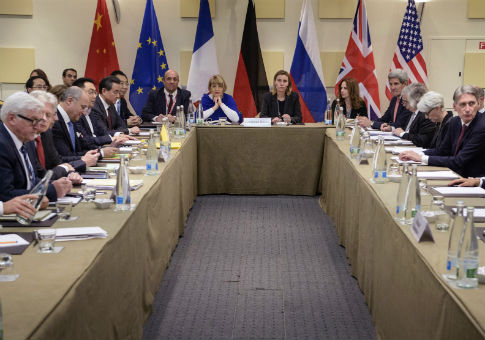The State Department’s focus on Iran’s nuclear capacity at the expense of missile technology could hinder the effort to prevent it from developing nuclear weapons, according to experts who spoke at a Tuesday panel discussion hosted by the Hudson Institute.
In negotiations with Iran, the United States has focused on nuclear proliferation without considering the regime’s continued development of missile technology, according to Dr. David Cooper, chair of the Department of National Security Affairs at the U.S. Naval War College. Missile technology "turns out to be a remarkably accurate litmus test about any state’s nuclear intentions," Cooper said.
"Long-range missile programs really only make economic, political, or military sense in the broader context of an ambition to become a nuclear weapons power."
Despite being treated as a secondary concern to nuclear power by the State Department, Cooper said missiles should be added and dealt with in nuclear negotiations, as opposed to being treated as two isolated issues.
He said that given that a warhead on conventional missiles can be designed for a nuke, Iran’s possession of ICBMs is an absolute indicator of the regime’s ambition to become a nuclear power.
The president must address and ask Tehran to give up possible nuclear delivery systems, such as long-range and land-attack cruise missiles, for the sake of the preservation of regional and international security, according to Cooper.
"If Iran were to make a bolt for serious nuclear weapons power status, along the same lines as Pakistan or India—if we think in those terms, then the missiles, far from being peripheral, actually are, rather, a heed to the whole solution for the Iranians … giving Iran a blanket pass on any and all of its missile programs, to include its longest range and most threatening programs and developments, really does raise some troubling questions about the deal," Cooper said.
President Obama has said negotiations afford the United States more time to respond should Iran develop nuclear weapons.
"We know that even if they wanted to cheat, we would have at least a year [to react], which is three times longer than we’d have right now," he told the New York Times in April.
Dr. Thomas Karako, senior fellow at the Center for Strategic and International Studies, said the United States has already lost its chance to head off missile development. Given the concessions and framework laid out thus far, he said, the United States is left to negotiate with only sanctions to use as leverage. Iran has the upper hand, as they have expressed willingness to walk away from talks with the president, according to Karako.
"There is a spectrum of responses … if missiles were in the talks, we would be having a different conversation," Karako said. "We have failed and lost our chance at non-proliferation … that optimal position is now in the ‘coulda, shoulda, woulda’ category."
